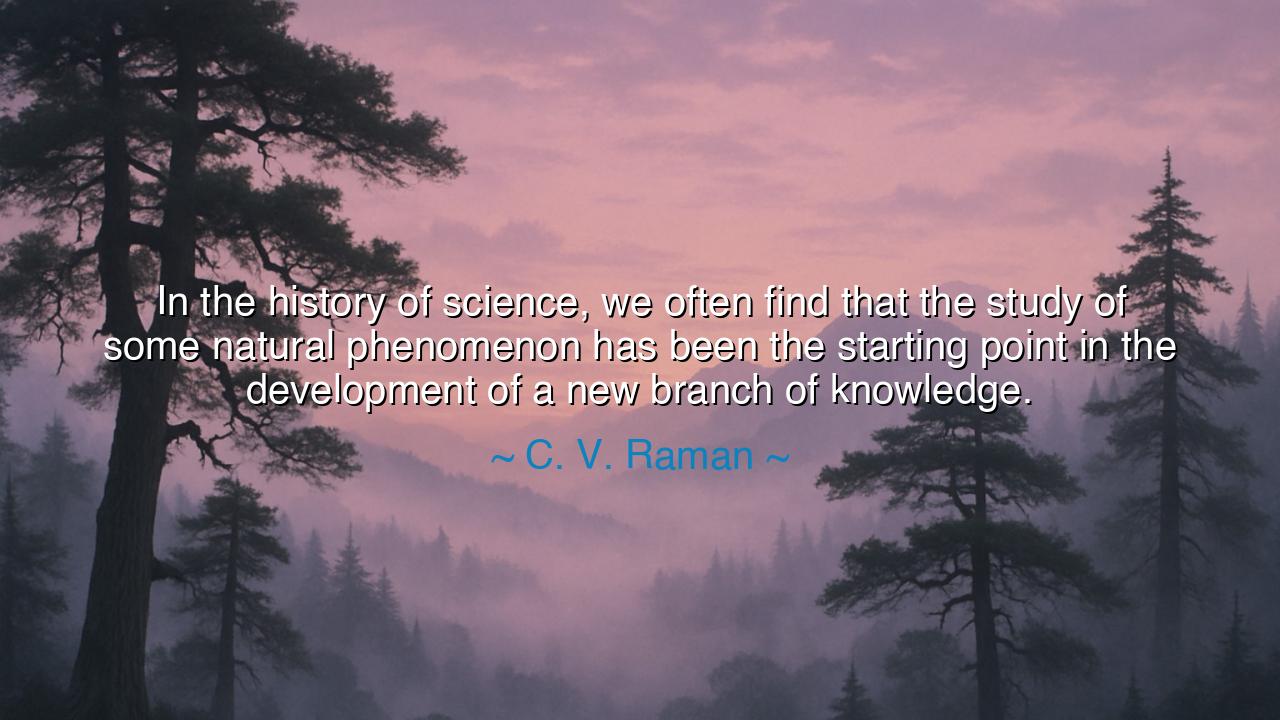
In the history of science, we often find that the study of some
In the history of science, we often find that the study of some natural phenomenon has been the starting point in the development of a new branch of knowledge.






In the golden voice of wisdom, C. V. Raman, the sage of light and sound, once declared: “In the history of science, we often find that the study of some natural phenomenon has been the starting point in the development of a new branch of knowledge.” These words, though spoken by a man of physics, carry the pulse of all discovery, the eternal rhythm of curiosity that has driven humankind from the cave to the cosmos. Raman, who gazed upon the deep blue of the sea and turned it into revelation, speaks here of the sacred truth that wonder is the seed of wisdom, and that from the humble observation of nature springs the infinite tree of knowledge.
The origin of this quote lies in Raman’s own life—a life devoted not to wealth or acclaim, but to the pursuit of understanding. In 1928, while journeying across the ocean, he was struck by a question that countless others had seen but never pondered: Why is the sea blue? To most, it was a matter of beauty, but to Raman, it was a mystery demanding reverence. He studied the scattering of light within transparent substances and, through this simple curiosity, uncovered what the world now calls the Raman Effect—a discovery that opened a new branch of physics, revealing how light interacts with matter. For this, he became India’s first Nobel laureate in science, yet the greater glory was not the award, but the truth he illuminated: that every great discovery begins not with complexity, but with a question born of wonder.
From the beginning of civilization, this pattern has repeated like a divine refrain. The fall of an apple from a tree stirred Newton to uncover the laws of gravitation; the trembling of a compass needle led Faraday to reveal the dance between electricity and magnetism; the flicker of light upon glass inspired Galileo to fashion his telescope and peer into eternity. Each of these minds, like Raman, began not with ambition, but with awe. They looked upon nature not as a machine, but as a temple, and from their devotion to its mysteries emerged entire kingdoms of knowledge—physics, astronomy, chemistry, biology—all born from the same act: the act of looking deeply.
Raman’s words, therefore, are not merely a reflection on science—they are a hymn to the human spirit. They remind us that the universe speaks, but only those who listen with patience and humility can hear its voice. To study a “natural phenomenon” is not just to measure or analyze—it is to commune with creation, to trace the handwriting of the cosmos across the canvas of the everyday. The flutter of a leaf, the sparkle of a droplet, the hum of a bee—all are invitations to insight. The ancients called this reverence philosophia, the love of wisdom. Modern science, when practiced with that same love, is its heir.
Yet, there is a deeper truth within Raman’s teaching. He tells us that progress does not arise from force or ambition, but from attention—the willingness to look closely at what others overlook. It is not grand laboratories that create discovery, but the spirit of inquiry that burns within the seeker. The greatest revolutions in thought have begun not in palaces of learning, but in quiet moments of reflection: Archimedes in his bath, Mendel in his garden, Raman on a ship’s deck beneath a sunlit sea. Each of them shows us that genius is not a gift of birth, but the reward of curiosity unchained.
And so, O listener of the ages, what lesson shall we take from this? That knowledge is not found in distance, but in depth. To learn, one need not journey to other worlds; it is enough to see the world anew. The path of discovery lies not in seeking grand answers, but in asking honest questions. Let your eyes be open, your heart attuned to wonder, your mind humble before the mystery of creation. For every phenomenon—every ripple, every color, every shadow—holds within it the seed of a revelation yet to come.
Let this, then, be your practice: observe, question, and revere. Look upon the smallest fragment of nature as a gateway to truth. Remember Raman, who saw in the sea a cosmos of light, and remember that all knowledge, like the universe itself, begins in stillness and awe. For the history of science, as he said, is not merely the tale of progress—it is the story of humanity awakening to its own capacity to wonder. And so long as that wonder lives, the flame of discovery shall never be extinguished.






AAdministratorAdministrator
Welcome, honored guests. Please leave a comment, we will respond soon